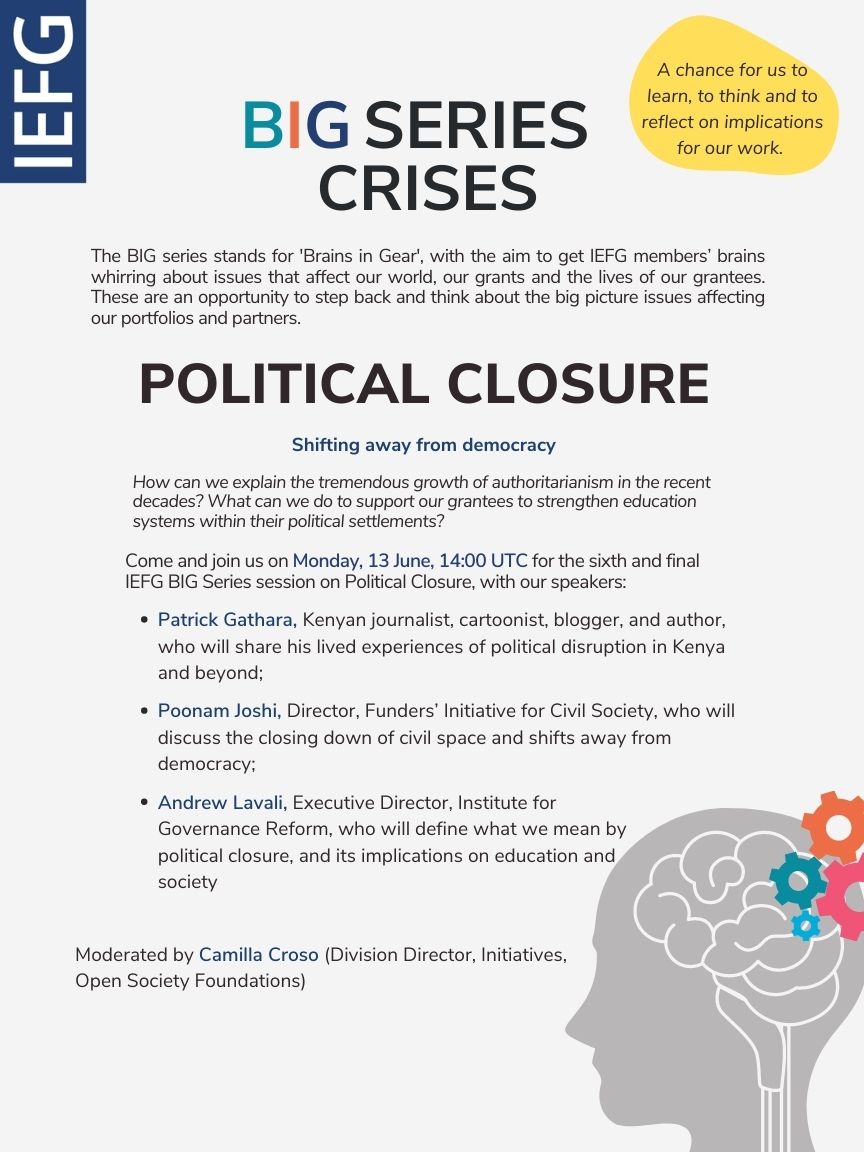|
IEFG BIG SERIES: Crises - Political Closure - 13 June 2022  Audio recordingReflections from the Session'There's not overt censuring. It's more co-option to cow an independent press.' 'We are seeing the decline of democracy and even where there are democratic elections it does not mean that political space is open.' 'See schools as a battlefield for the future of democracy. Shape critical thinking and critical minds. Produce engaged citizens.' 'Schools are a politically contested space: on history, on identity. Governments use curricula to advance majoritarian agendas, anti-gender campaigns and more.' 'We are seeing the opposite of apathy: youth are more politically engaged than we've seen before.' 'These young people are at great risk, of being punished for standing up. I'm not sure education systems are ready to support these students: where do education funders sit on this issue?' 'We also need to think about education outside of the formal system: to provide spaces outside the system to come together and debate and learn.'
Resources➡️ Ur-Fascism by Umberto Eco:
The word “Fascist” is used with great ease and lightness in our own time. It’s applied as a kind of “cult insult.” Someone or something is Fascist when trying to impose arbitrary laws or rules on others. The question ‘What do contemporary “Fascisms” have in common with the historical ones?’ was taken up by the recently deceased Italian novelist and semiotician, Umberto Eco, who plunged into the word “Fascist” to clarify some of its implications. Eco distinguished this, for example, from Hitler’s Nazism, although he conceded that the “fascist game can be played in many ways, and the name of the game doesn’t change.” In this essay published in the New York Review of Books, Eco distilled the 14 typical elements of “Ur-Fascism or Eternal Fascism,” while warning that, “These features cannot be organised into a system; many of them contradict each other and are also typical of other kinds of despotism or fanaticism. But it is enough that one of them be present to allow fascism to coagulate around it.” ➡️ The Nature of Fascism by Roger Griffin:
The Nature of Fascism draws on the history of ideas as well as on political, social and psychological theory to produce a synthesis of ideas and approaches that will be invaluable for students. ➡️ Why Africa does not appear to be ‘standing with Ukraine:
Written by one of our speakers for this week – Patrick Gathara – this article outlines how ‘standing with Ukraine’ is not just a humanitarian statement, but a political one too. Africans, including Patrick, who have pointed out the racist hypocrisies of Western media, governments and societies evident in the response have been accused of a convenient whataboutism which blinds one to the suffering of Ukrainians. Others have suggested that Africans are guilty of similar hypocrisies to those they accuse the West of, seemingly more concerned about events and crises thousands of miles away but happy to ignore the many crises on their own doorstep. Find the article here. |



